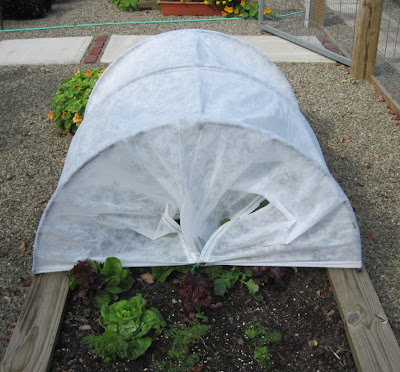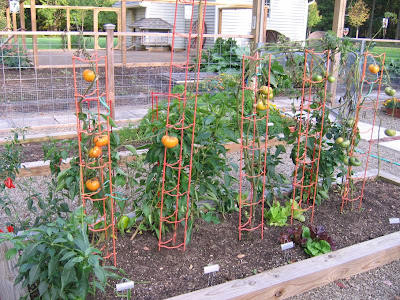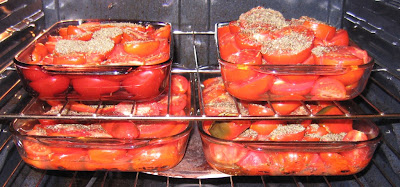Imagine you’re a rock. You’
ve just been sitting around since the last Ice Age. Doing nothing. Now and then an animal walks by. The animals change over time from wild to domestic, then you start seeing humans occasionally. The humans cut the trees and change the view, but for the most part they leave you alone. Now and then they run into you with something and make a lot of noise. Some of your neighbors have had pieces chopped off or have been pried out of the ground and hauled away. But not you. You’re a big rock.
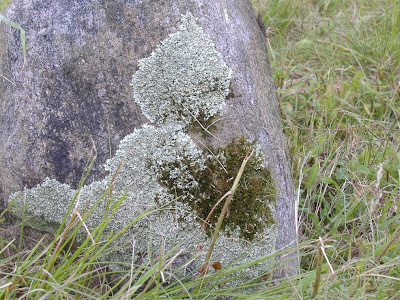
Then one day a big machine comes and plucks you out of the ground. Talk about surprise! Next thing you know, you’re whizzing along at high speeds of oh, 3 or 4 miles per hour, over hill and dale.
Whhheeeeee! That glacier was nothing compared to this. Then you’re dumped on a big pile of rocks. You’
ve heard tell about rock piles and now, finally, you’re part of one. And that fetching igneous rock with the elaborate lichens that you’
ve been creeping toward for the past, oh ten thousand years or so, is suddenly mere inches away. Yes,
indeedy, it is an exciting day to be a rock!
In order to
accommodate and encourage the farmer who rents our land, and anyone else who might want to brush hog it now or in the future, we spend a day now and then picking rocks. It's expensive and time consuming enough to keep the land in shape without adding the variable of ruining a blade or worse on a grass covered boulder. This year, the target was the area I've come to refer to as "Hell's Half Acre". I've seldom gone back there, as it's a good hike from any direction. In my childhood I remember it as being little grazed, rarely mowed, and generally avoided, usually chin high in weeds.
A few weeks ago I realised why. I made it back there on my rock scouting expeditions, and found that Bruce had actually managed to brush hog it. And it looked as if the glacier went through last month. I could stand in one spot and count at least a dozen boulders, some sitting right up on top of the ground. Obviously no one has ever picked rock back here. Add to that the fact that it appears that at one point a tornado came through and knocked the woods down because there are so many hillocks which are usually caused by root balls being turned up. This was not a place where the land was carefully cleared of rocks and stumps, and no one has ever plowed it. I can guarantee that! This must be what Bruce was referring to when he said he'd like to see a
dozer smooth out some of the pasture. This must be heck to mow.

I took the day off. I was actually looking forward to playing outside all day. Tim drove one of our tractors out, 45 minutes, because we needed the big tractor with the back hoe. I got the easy job. I drive from rock to rock and Tim digs. There is still a lot of on and off and twisting and looking. The next day I simply could NOT turn my head to the left.

We worked for 7 hours (not counting drive time) and gathered 197 rocks ranging from the size of your noggin to the size of your large appliances.

Here is a photo of the BIG rock from our last rock day two years ago. And one of the rock piles from that day.

On to the next one...
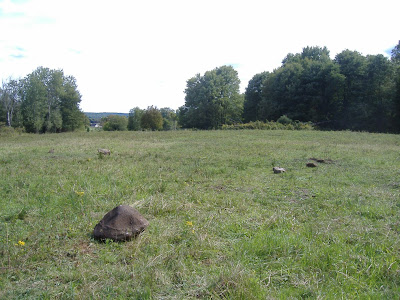
Behind us, the boulders littered the pasture like dinosaur poop.
This was fun for the first, oh 4 or 5 hours. Really good fun. Lots better than sitting in an office! Then as 5 o'clock neared, we realised we were never going to see the end of the rocks, and we had two dozen not piled, and no good spot to pile them. We had added to 3 or 4 existing piles, and started 3 of our own in out of the way places. Last time we had piled the rocks near the gates and sold them. This wasn't plausible this time. The price of rocks would not have covered the diesel and time it took to get them near a gate.
So at 5 o'clock when Tim asked if that was all for today, I fibbed and said yes. There are two other areas we didn't get to, but those rocks have been there for a really long time, and they will still be there next year. Along with whatever else heaves up through with the frost. My uncle said one year he counted how many field stones went into a trailer load, did some calculations on the acreage, and estimated that my grandfather had moved over 750,000 in his lifetime. With those numbers, we've only just begun.
Imagine doing this without a tractor. I'm a pretty active person, and Tim works outside all day long, so we were ready for a day picking rock. I remembered to take some Aleve before I, uh leaved the house. We covered the outer path of about 50 acres. There was a lot of rock rolling and rock picking up. Some of them we just pried out of the ground with a spud bar. How this works is you are standing around, leaning on the bar (used to help roll the rock into the bucket) waiting for whomever is driving to get back from dumping a load of rocks on the rock pile, when you spot another rock hiding in the grass. You take careful aim and jab the bar into the earth next to the rock and pry. You watch the earth around to see how much of it moves, and by this you calculate the approximate size of the rock and your chances of getting it out by hand.
Sometimes you are still jabbing and prying when the tractor comes back, and you gratefully step aside and make room for the back hoe and the front end loader. My grandfather had no backhoe and no front end loader. He had a tractor and a trailer. His father before him had a stone boat and a team of horses. The folks before my family likely had a stone boat and a team of oxen. We have found ox shoes in the fields. Imagine clearing rock all day with a pry bar, a stone boat, and a team of oxen. It would take more than Aleve to get me through that!
